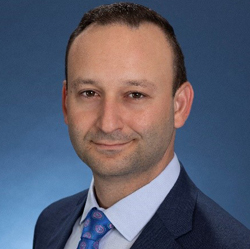The healthcare headlines of the last few years have made it clear. The world’s leading technology companies are coming for healthcare. Amazon, Alphabet, Apple, Google and Microsoft have all made significant investments in the industry, whose rising costs and shifting customer needs make it ripe for disruption. Gregory J. Moore, MD, PhD, Corporate Vice President, Microsoft Health, joined our recent Global Healthcare Virtual Conference to discuss the next steps on the firm’s journey to advance how healthcare is experienced and delivered across the care continuum.
As healthcare providers and companies have struggled over the last ten years to convert patient files to electronic health records (EHR), the shortfalls in their IT infrastructure have become apparent. And technology firms have stepped in to close the gap, recognizing the massive potential in this market. At the same time, there has been a growing interest in telemedicine, biotechnology, surgical robotics and other innovations that could work to lighten the administrative load of practitioners and power medical advances.
Now the world has been hit by COVID-19, accelerating many of these transformational trends. As Microsoft announced a slew of new innovations for the industry – including the launch of Microsoft Cloud for Healthcare – Gregory J. Moore, MD, PhD, Corporate Vice President, Microsoft Health, explains how he wants to reimagine healthcare not as a disruptor, but as a partner in empowering innovation.
Healthcare in the cloud
“This really is Microsoft's first industry-specific cloud and, frankly, one that we accelerated to provide tools for the unprecedented COVID-19 crisis that we're all in,” says Gregory. The healthcare solution brings together Microsoft’s three cloud offerings – Azure, 365 and Dynamics – and adds tools like Power BI, its business intelligence solution.
But it takes all that one step further by building healthcare-specific solutions with partner firms across the globe. “As a technology company, the only way we’re going to have the impact we desire on the healthcare ecosystem is with partners in the industry. We are not a healthcare life sciences company. We are a technology company with a core competency in cloud, in AI, and insights and analytics. We can only make an impact through deep partnerships with companies in the industry, like Walgreens Boots Alliance, Novartis and Humana,” Gregory explains.
“As a technology company, the only way we’re going to have the impact we desire on the healthcare ecosystem is with partners in the industry.”
- Gregory J. Moore, MD, PhD
Tackling the Big Problems
The headline-grabbing solution has been with Nuance DAX, offering ambient clinical intelligence technology to allow patient records to write themselves. The solution uses speech-recognition to synthesize patient-clinician conversations, integrate the data with contextual information from the HER, and then auto-populate the patient’s medical record.
“As a former physician, the question that my colleagues have always asked me is, ‘how do I solve the problem of documentation in clinical care?’ With Nuance DAX, clinicians can focus on conversations with their patients, while a purpose-built ambient device – with highly optimized microphones, interactive displays, integrated biometrics and multi-sensory capabilities – securely captures the conversation. So a physician can talk to a patient and capture that entire conversation and walk out of that exam room with their medical notes 95% complete.”
Microsoft is touting Nuance DAX as a solution that will help avoid physician burnout by removing the burden of administration, which can add two hours to every hour spent in direct patient care. But Microsoft isn’t just hoping to solve big issues like physician burnout – it has even loftier ambitions.
Gregory is convinced that digital health can help a lot more people get the treatment they need when necessary. “There are 4 billion people on the planet without meaningful access to healthcare. That’s a big number. It’s over half the population. Technology has a role to play in creating access to care,” says Gregory. “How can we accelerate the pace of innovation with the sense of urgency that these 4 billion people on the planet need? Our partnerships across the globe will be key in this particular area.”
“There's 4 billion people on the planet without meaningful access to healthcare. That’s a big number. It’s over half the population. Technology has a role to play in creating access to care.”
- Gregory J. Moore, MD, PhD
The Business Opportunity
Along the way, Microsoft hopes to embed itself in an industry that’s roughly 18% of global GDP, amounting to a baseline of around $3.5 trillion of spending in the US alone. The company is starting cautiously because it believes it will take time for patients to trust big tech with their health.
“Today’s healthcare providers have been delivering care in their communities for over a century or more, and they are earning that trust through relationships with patients every day on the frontline,” says Gregory. “Tech is a new player. We're taking a very humble approach here, learning from those who have earned that trust. That's why it's so important to have a partnering approach.”
How COVID-19 is Accelerating Change
At a time where digital and technological fixes are being sought for COVID-19 problems, Gregory tells the story of Microsoft’s partnership with Providence Healthcare System, which used its Health Bot chat service to answer patient questions and screen for coronavirus. In just a couple of weeks, Microsoft had scaled that service to over 1,600 healthcare systems in 23 countries around the world.
“The world’s gone virtual,” says Gregory. “The pandemic has accelerated regulatory changes in healthcare across the US. Barriers have come down overnight. Virtual health is a changed world. In fact, we're hearing from both our partners and healthcare systems, physicians, nurses, and patients, that they love the experience and its convenience. This is a lasting change, not a temporary one.”
As the tools are adopted, their effectiveness (or not) is proved. In the bot example, call volumes for screening and triage went down 40-50%. Once effectiveness is proven, adoption will become even more rapid.
“Success for me is that Microsoft is a key part of the ecosystem delivering the core technology to further health and healthcare for individuals across the planet. Success for me is billions of lives touched by a partnership technology solution,” says Gregory.
“That could be empowering an oncologist as they care for their patients, or decoding the human immune system with a company like Adaptive Biotechnologies. Or it could be supporting a community health worker in a village with a device that helps her triage a patient, infused with connectivity and AI and machine learning solutions.”

Gregory J. Moore, MD, PhD
Corporate Vice President, Microsoft Health
Dr. Moore leads Microsoft’s Health efforts globally and is responsible for product strategy, product development, and research including AI and machine learning technology for healthcare and life sciences. He is also Microsoft’s senior executive leading dedicated research and development collaborations with Microsoft’s strategic alliance partners in this domain with the goal of enabling a more open, interoperable, and AI-infused foundation for healthcare delivery that aspires to enable access to healthcare for all globally.
Greg is an engineer (MIT PhD), practicing neuroradiologist, clinical informaticist, neuroscientist, and innovator experienced in assembling and inspiring highly talented teams to positively transform healthcare for the benefit of humankind.

 Start Watching
Start Watching
